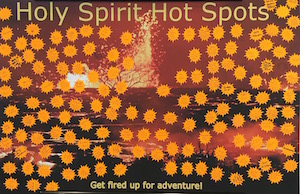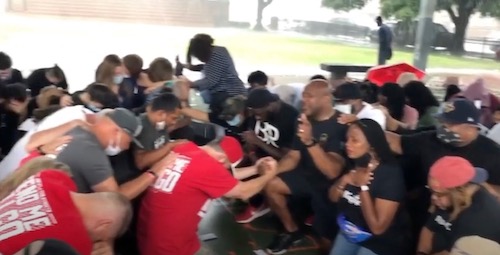We Believe
Christians call themselves “people of the Book” –which is true, for Scripture is God’s revelation of Himself to us. Yet we are also a creedal people–those who repeat the basic tenets of our faith through ancient statements that witness to the truth of Scripture.
Creeds in general, and certain creeds specifically, help believers crystallize what Scripture teaches into statements that can be readily memorized and passed down.
For much of history, people were either largely illiterate or the printed word was not available, so verbal repetition was vital to teaching the next generation. Liturgical churches today continue the recitation of, usually, the Nicene Creed, or its adapted version authorized at the Council of Constantinople (381 AD).
I grew up in a liturgical tradition, which means that I can recite the Nicene Creed without difficulty even though I’ve attended Protestant churches for the last 19 years. Occasionally a church might lead the congregation in such a creed, but that has been a very rare occurrence. Though I did not miss it for a long time, I have come to appreciate some of the beauty of liturgy, specifically its willingness to teach and recite the creeds. Why? Because creeds teach us what we believe, what orthodoxy is for a Christian. I find too many believers who cannot articulate their faith beyond “Jesus died for me” (which is crucial, don’t get me wrong, but there’s more to it).
Some object to creeds because they are “man-made.” I would argue that those same people have no problem listening to podcasts of their favorite preachers, reading commentaries or Christian living or devotional books to supplement their Bible study, or watching a DVD study series by well-known Bible teachers. We know they are not infallible, yet we recognize their value to us. As Christians, should we not consider how the Holy Spirit has spoken to our brothers and sisters over the millennia as they have struggled with various issues? Why not also value the conclusions of the Church Fathers, the creeds that were carefully formulated to battle heresies infiltrating the church?
As Spurgeon once said, “you are not such wiseacres as to think or say that you can expound the Scripture without the assistance from the works of divine and learned men who have labored before you in the field of exposition . . . . It seems odd that certain men who talk so much of what the Holy Spirit reveals to themselves, should think so little of what he has revealed to others.”
Does your church regularly recite the Nicene Creed? What benefit have you derived from that experience? If the creeds are not part of your worship experience, have you felt the lack? Or do you feel that your worship experience is complete without them? Does the church rely on the creeds too much or just enough or not enough?
We believe in one God, the Father,
the Almighty, maker of heaven and earth,
of all that is, seen and unseen.
We believe in one Lord, Jesus Christ,
the only son of God,
eternally begotten of the Father,
God from God, Light from Light,
true God from true God,
begotten, not made,
of one being with the Father.
Through him all things were made.
For us and for our salvation
he came down from heaven:
by the power of the Holy Spirit
he became incarnate from the Virgin Mary,
and was made man.
For our sake he was crucified under Pontius Pilate;
he suffered death and was buried.
On the third day he rose again
in accordance with the Scriptures;
he ascended into heaven
and is seated at the right hand of the Father.
He will come again in glory
to judge the living and the dead,
and his kingdom will have no end.
We believe in the Holy Spirit, the Lord, the giver of life,
who proceeds from the Father and the Son.
With the Father and the Son
he is worshipped and glorified.
He has spoken through the Prophets.
We believe in one holy catholic and apostolic Church.
We acknowledge one baptism for the forgiveness of sins.
We look for the resurrection of the dead,
and the life of the world to come. AMEN.



5 Comments
Kerry
Spurgeon quote
I love the quote from Spurgeon. Can you please tell the the source? I’d like to write that down in my commonplace book, but I always include the original source.
Thank you!
Kelley Mathews
Spurgeon Quote
Indeed, Kerry, I should have included my source. You can find Spurgeon’s comments in his
Andy
Spurgeon’s statement
Specifically, it is p. 11 in that book, which can be viewed in its entirety at Google Book Search. The quotation is found here:
http://books.google.com/books?id=FF4QAAAAYAAJ&printsec=frontcover&dq=Commenting+and+Commentaries&ei=H4rpSb31A4qgMomnnJkB#PPA11,M1
Heather A. Goodman
My husband and I joined an
My husband and I joined an Anglican church in the past couple of years, mostly because of the liturgy. Our church recites either the Nicene or the Apostle’s Creed weekly. It connects us to the historic Church, to the believers who went before us and whom we will meet in the age to come.
We also enjoy living out the story of the Bible through the liturgy of the year. In doing so, we participate in the rhythm of the Bible.
Kerry
Spurgeon Quote
Thank you Andy for the link to the book!
And Kelley, thank you for the blog post! I think you provided perfectly acceptable “source info” for most people and most situations, I just like to put the original source in my commonplace book for my own future reference. Usually this is not a problem because I’ve gathered the quote myself from a book!
Anyway – thank you both for your help!